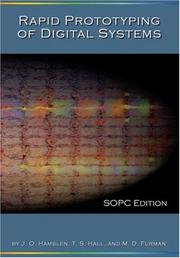| Listing 1 - 4 of 4 |
Sort by
|

ISBN: 1280200464 9786610200467 0306470519 0792386043 9780792386049 Year: 2000 Publisher: Boston: Kluwer,
Abstract | Keywords | Export | Availability | Bookmark
 Loading...
Loading...Choose an application
- Reference Manager
- EndNote
- RefWorks (Direct export to RefWorks)
Rapid Prototyping of Digital Systems provides an exciting and challenging laboratory component for undergraduate digital logic and computer design courses. The more advanced topics and exercises also make this text useful for upper level courses in digital logic or programmable logic. Design engineers working in industry will want to consider this text for a rapid introduction to PPLD technology and logic synthesis using commercial CAD tools. Rapid Prototyping of Digital Systems includes two tutorials on the Altera CAD tool environment, an overview of programmable logic, and a design library with several easy-to-use input and output functions. These features were developed to help students get started quickly. Early design examples use schematic capture and library components. VHDL is used for more complex designs after a short introduction to VHDL-based synthesis. The approach used in this text reflects contemporary practice in industry more accurately than the more traditional TTL protoboard-based laboratory courses. Designs containing up to twenty thousand gates are possible with the Altera Student Version CAD tools and the UP 1 board. Rapid Prototyping of Digital Systems contains a number of interesting and challenging laboratory projects involving serial communications, state machines with video output, video games and graphics, simple computers, keyboard and mouse interfaces, robotics, and a RISC processor core. These projects were all developed on the student version of the Altera CAD tools and can be implemented on the Altera UP 1 board.
Field programmable gate arrays --- Programmable array logic. --- VHDL (Computer hardware description language) --- Rapid prototyping. --- Computer-aided design. --- Engineering. --- Computer-aided engineering. --- Electrical engineering. --- Electronic circuits. --- Circuits and Systems. --- Electrical Engineering. --- Computer-Aided Engineering (CAD, CAE) and Design. --- Programmable array logic --- Rapid prototyping --- Computer-aided design --- Systems engineering. --- Computer engineering. --- Computer aided design. --- CAE --- Engineering --- Electric engineering --- Electron-tube circuits --- Electric circuits --- Electron tubes --- Electronics --- Data processing --- Field programmable gate arrays - Computer-aided design
Book
ISBN: 8132225198 8132225201 Year: 2016 Publisher: New Delhi : Springer India : Imprint: Springer,
Abstract | Keywords | Export | Availability | Bookmark
 Loading...
Loading...Choose an application
- Reference Manager
- EndNote
- RefWorks (Direct export to RefWorks)
This book describes the optimized implementations of several arithmetic datapath, controlpath and pseudorandom sequence generator circuits for realization of high performance arithmetic circuits targeted towards a specific family of the high-end Field Programmable Gate Arrays (FPGAs). It explores regular, modular, cascadable, and bit-sliced architectures of these circuits, by directly instantiating the target FPGA-specific primitives in the HDL. Every proposed architecture is justified with detailed mathematical analyses. Simultaneously, constrained placement of the circuit building blocks is performed, by placing the logically related hardware primitives in close proximity to one another by supplying relevant placement constraints in the Xilinx proprietary “User Constraints File”. The book covers the implementation of a GUI-based CAD tool named FlexiCore integrated with the Xilinx Integrated Software Environment (ISE) for design automation of platform-specific high-performance arithmetic circuits from user-level specifications. This tool has been used to implement the proposed circuits, as well as hardware implementations of integer arithmetic algorithms where several of the proposed circuits are used as building blocks. Implementation results demonstrate higher performance and superior operand-width scalability for the proposed circuits, with respect to implementations derived through other existing approaches. This book will prove useful to researchers, students, and professionals engaged in the domain of FPGA circuit optimization and implementation.
Field programmable gate arrays -- Computer-aided design. --- Electrical & Computer Engineering --- Engineering & Applied Sciences --- Electrical Engineering --- Field programmable gate arrays --- Computer-aided design. --- Field programmable logic arrays --- FPGAs --- Gate array circuits --- Programmable logic devices --- Systems engineering. --- Electronics. --- Logic design. --- Circuits and Systems. --- Electronics and Microelectronics, Instrumentation. --- Logic Design. --- Design, Logic --- Design of logic systems --- Digital electronics --- Electronic circuit design --- Logic circuits --- Machine theory --- Switching theory --- Electrical engineering --- Physical sciences --- Engineering systems --- System engineering --- Engineering --- Industrial engineering --- System analysis --- Design and construction --- Electronic circuits. --- Microelectronics. --- Microminiature electronic equipment --- Microminiaturization (Electronics) --- Electronics --- Microtechnology --- Semiconductors --- Miniature electronic equipment --- Electron-tube circuits --- Electric circuits --- Electron tubes

ISBN: 0387726705 0387726713 Year: 2008 Publisher: New York, NY : Springer US : Imprint: Springer,
Abstract | Keywords | Export | Availability | Bookmark
 Loading...
Loading...Choose an application
- Reference Manager
- EndNote
- RefWorks (Direct export to RefWorks)
RAPID PROTOTYPING OF DIGITAL SYSTEMS provides an exciting and challenging environment for rapidly adapting System-on-a-Programmable Chip (SOPC) technology to existing designs or integrating the new design methods into a laboratory component for digital logic, computer and embedded-design curriculums. New to this edition is an introduction to embedded operating systems for SOPC designs. Featuring four accelerated tutorials on the Quartus II and Nios II design environments, this edition progresses from introductory programmable logic to full-scale SOPC design seamlessly integrating hardware implementation, software development, operating system support, state-of-the-art I/O, and IP cores. This edition features Altera's new 7.1 Quartus II CAD and Nios II SOPC tools and includes projects for Altera's DE1, DE2, UP3, UP2, and UP1 FPGA development boards.
Electronic books. -- local. --- Field programmable gate arrays -- Computer-aided design. --- Gate array circuits -- Computer-aided design. --- Field programmable gate arrays --- Logic design --- VHDL (Computer hardware description language) --- Verilog (Computer hardware description language) --- Rapid prototyping --- Electrical Engineering --- Electrical & Computer Engineering --- Engineering & Applied Sciences --- Computer-aided design --- Gate array circuits --- Computer-aided design. --- Gate arrays --- Field programmable logic arrays --- FPGAs --- Engineering. --- Computer-aided engineering. --- Engineering design. --- Electrical engineering. --- Electronic circuits. --- Circuits and Systems. --- Computer-Aided Engineering (CAD, CAE) and Design. --- Engineering Design. --- Electrical Engineering. --- Integrated circuits --- Programmable logic devices --- Systems engineering. --- Computer aided design. --- Computer engineering. --- Computers --- Design, Engineering --- Engineering --- Industrial design --- Strains and stresses --- CAD (Computer-aided design) --- Computer-assisted design --- Computer-aided engineering --- Design --- Engineering systems --- System engineering --- Industrial engineering --- System analysis --- Design and construction --- Rapid prototyping. --- Electric engineering --- CAE --- Electron-tube circuits --- Electric circuits --- Electron tubes --- Electronics --- Data processing
Book
ISBN: 1441974172 9786612972706 1441974180 1282972707 1489981578 Year: 2010 Publisher: New York : Springer,
Abstract | Keywords | Export | Availability | Bookmark
 Loading...
Loading...Choose an application
- Reference Manager
- EndNote
- RefWorks (Direct export to RefWorks)
Low-Power Variation-Tolerant Design in Nanometer Silicon Edited by: Swarup Bhunia Saibal Mukhopadhyay Design considerations for low-power operations and robustness with respect to variations typically impose contradictory requirements. Low-power design techniques such as voltage scaling, dual-threshold assignment and gate sizing can have large negative impact on parametric yield under process variations. This book focuses on circuit/architectural design techniques for achieving low power operation under parameter variations. Coverage includes logic and memory design, modeling and analysis, as well as design methodology to achieve simultaneously low power and variation tolerance, while minimizing design overhead. •Introduces readers to some of the most important challenges in low-power and variation-tolerant IC design in nanoscale technologies; •Presents a holistic view of Low-Power Variation-Tolerant Design, at different levels of design abstraction, starting from device to circuit, architecture and system; •Offers comprehensive coverage of modeling, analysis and design methodology for low power and variation-tolerant logic circuits, memory and systems, micro-architecture, DSP, mixed-signal and FPGAs, including current industrial practices, technology scaling trends, and emerging challenges; •Describes in detail modeling and analysis of different variation effects (die-to-die and within-die, process and temporal) on low-power designs; Includes coverage of ultra low-power and robust sub-threshold design.
Field programmable gate arrays -- Computer-aided design. --- Integrated circuits -- Very large scale integration. --- Low voltage integrated circuits -- Computer-aided design. --- Nanoelectromechanical systems -- Computer-aided design. --- Low voltage integrated circuits --- Integrated circuits --- Electrical & Computer Engineering --- Engineering & Applied Sciences --- Electrical Engineering --- Design and construction --- Mathematical models --- Low voltage integrated circuits. --- Integrated circuits. --- Chips (Electronics) --- Circuits, Integrated --- Computer chips --- Microchips --- Low power consumption chips --- Low power integrated circuits --- Reduced voltage integrated circuits --- Engineering. --- Computer-aided engineering. --- Electronic circuits. --- Circuits and Systems. --- Computer-Aided Engineering (CAD, CAE) and Design. --- Electronic circuits --- Microelectronics --- Low voltage systems --- Systems engineering. --- Computer aided design. --- CAD (Computer-aided design) --- Computer-assisted design --- Computer-aided engineering --- Design --- Engineering systems --- System engineering --- Engineering --- Industrial engineering --- System analysis --- CAE --- Electron-tube circuits --- Electric circuits --- Electron tubes --- Electronics --- Data processing
| Listing 1 - 4 of 4 |
Sort by
|

 Search
Search Feedback
Feedback About UniCat
About UniCat  Help
Help News
News